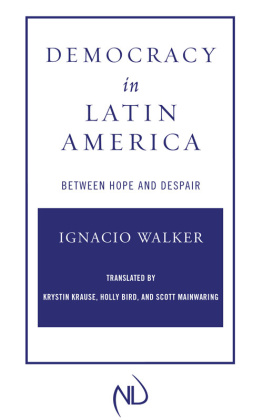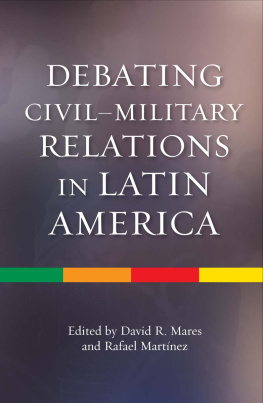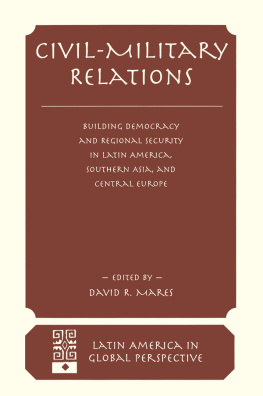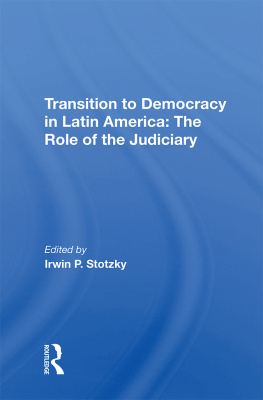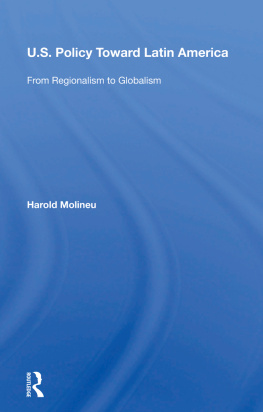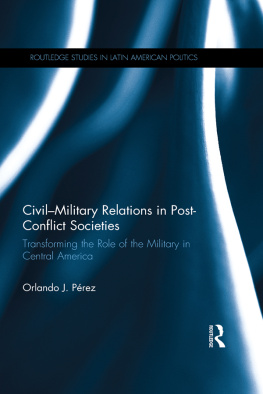Cover
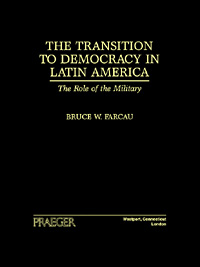
| title | : | The Transition to Democracy in Latin America : The Role of the Military |
| author | : | Farcau, Bruce W. |
| publisher | : | Greenwood Publishing Group |
| isbn10 | asin | : | 0275956369 |
| print isbn13 | : | 9780275956363 |
| ebook isbn13 | : | 9780313048166 |
| language | : | English |
| subject | Civil-military relations--Latin America, Latin America--Armed Forces--Political activity, Democracy--Latin America, Democratization--Latin America, Latin America--Politics and government--1948- , Democracy , South America |
| publication date | : | 1996 |
| lcc | : | JL956.C58F37 1996eb |
| ddc | : | 322/.5/098 |
| subject | : | Civil-military relations--Latin America, Latin America--Armed Forces--Political activity, Democracy--Latin America, Democratization--Latin America, Latin America--Politics and government--1948- , Democracy , South America |
Page i
THE TRANSITION TO DEMOCRACY IN LATIN AMERICA
Page ii
This page intentionally left blank.
Page iii
THE TRANSITION TO DEMOCRACY IN LATIN AMERICA
The Role of the Military
BRUCE W.FARCAU

Page iv
Library of Congress Cataloging-in-Publication Data
Farcau, Bruce W.
The transition to democracy in Latin America: the role of the
military/Bruce W.Farcau.
p. cm.
Includes bibliographical references and index.
ISBN 0-275-95636-9 (alk. paper)
1. Civil-military relationsLatin America. 2. Latin America
Armed ForcesPolitical activity. 3. DemocracyLatin America.
4. Latin AmericaPolitics and government1948 I. Title.
JL956.C58F37 1996
322.5098dc20 965538
British Library Cataloguing in Publication Data is available.
Copyright 1996 by Bruce W.Farcau
All rights reserved. No portion of this book may be
reproduced, by any process or technique, without the
express written consent of the publisher.
Library of Congress Catalog Card Number: 965538
ISBN: 0-275-95636-9
First published in 1996
Praeger Publishers, 88 Post Road West, Westport, CT 06881
An imprint of Greenwood Publishing Group, Inc.
Printed in the United States of America

The paper used in this book complies with the
Permanent Paper Standard issued by the National
Information Standards Organization (Z39.481984).
10 9 8 7 6 5 4 3 2
Page v
This book is dedicated to my four loving daughters, Gracie, Alexandra, Michelle, and Sarah, since every word represents time that I might have spent in their precious company. They have followed me in my wanderings around the world unquestioningly and have taught me what real love is.
Page vi
This page intentionally left blank.
Page vii
Contents
Acknowledgments | ix |
Introduction | |
| The Nature of Latin American Military Regimes: 1960s to 1980s | |
| The Breakdown of Authoritarian Regimes | |
| Factionalism within the Latin American Military | |
| Leaving Gracefully: The Brazilian Case | |
| Being Dragged: The Bolivian Case | |
| Conclusions | |
Bibliography | |
Index | |
Page viii
This page intentionally left blank.
Page ix
Acknowledgments
I would first like to express my gratitude to the dozens of Latin American military officers and civilians who have taken the time to grant me interviews and to discuss my work in general over the years. As noted in the bibliography, discretion has prevented my printing all of their names, but their ideas were the keys to opening my gringo mind to the realities of Latin American politics and life. A large number of American State Department and other government officials, most with decades of experience following Latin American politics, also provided insightful comments which were of great use to me.
I would also like to thank the staff at the library of the Latin American Faculty of Social Sciences (FLACSO) in Mexico City for making their facilities available to me and to Dr. Marcelo Cavarozzi for making this possible. The staff at the Bolivian Academy of Military History (formerly known as the Circulo Militar) in La Paz also provided invaluable help in arranging interviews with prominent Bolivian military officers.
Dr. Cavarozzi, along with Dr. John Bailey and Dr. Eusebio Mujal-Leon, my mentors at Georgetown University, all shared the onerous task of reviewing my manuscript and offering their comments and criticisms, which ultimately made this work vastly superior to what it might have been otherwise. I would also like to thank Dr. Jeanne Kirkpatrick for encouraging me in the idea that this work needed to be undertaken.
Lastly, I would like to thank my wife and daughters for allowing me the time away from more important family duties to accomplish this work. If, at times around the dinner table, I appeared distracted, this is what I was thinking about.
Page x
This page intentionally left blank.
Page 1
Introduction
One of the characteristics which apparently distinguished the generation of military regimes which swept over Latin America from the mid-1960s to the mid-1970s from those which came before was the intended permanence of the new regimes. The former moderator model of military rule which had dominated civil-military relations in the region during the first half of the century, in which the military would step in to remove an unsuccessful or unwanted civilian administration, slightly modify the rules of the game, and step aside for a more acceptable civilian regime, had seemingly gone out of fashion. The new regimes, beginning with that set up in Brazil in 1964 and following through with those taking power in Argentina, Chile, and Uruguay by the mid-1970s, were headed by a new breed of military technocrats who had plans, not just to replace an objectionable leader or to deal with a specific political issue, but who claimed to have a blueprint for a new society in which their professional skills would enable them to rule more effectively than partisan political parties and demagogues. They intended to remain in power indefinitely and to reorder society to suit their tastes from the ground up. Such regimes, or at least regimes propounding broadly similar attitudes, were established throughout the region, with only the exception of the stalwarts of the pacted democracy, Venezuela and Colombia, and the unique cases of Mexico, Costa Rica, and the Dominican Republic.
Next page

